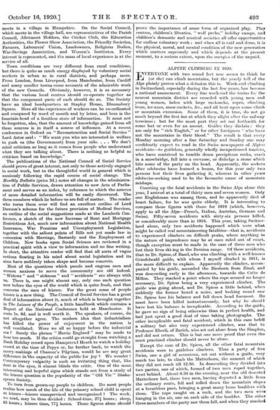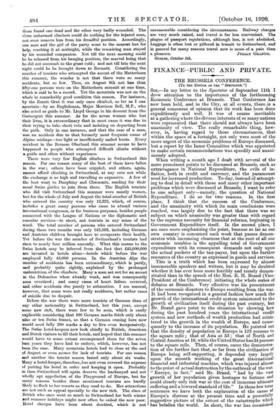ALPINE CLIMBING IN 1920.
EVERYONE with two sound feet now seems to think be (or she) can climb mountains, but the yearly toll of the Alps plainly proves what a delusion this is. Week-end clinching in Switzerland, especially during the last few years, has become a national amusement. Every fine week-end the trains fe: the nearest mountain district are crowded with young men and young women, laden with huge rucksacks, ropes, climbing irons, ice-axes, snow-rackets, &c., and all bent upon some climb or mountain excursion. Some of them, it is true, do not go much beyond the first inn at which they alight after the railway terminus ; but for the most part they set out forthwith for some hut or even for an ascent. Guides they disdain : they are only for "rich English," or for other foreigners "u-ho have not the mountains in their blood." The result is that every Monday morning after a fine Saturday and Sunday one may confidently expect to read in the Swiss newspapers of Alpine accidents—to gnideless, generally wholly inexperienced tourists, who have contrived to tumble down precipitous rocks, crash in a snowbridge, fall into a crevasse, or dislodge a stone which hits some of the party on the head. Apparently, the seekers after edelweiss have learned a lesson, for this year only two persons lost their lives gathering it, whores in other years edelweiss-seeking used to be the favourite cause of mountain mishaps.
Counting up the fatal accidents in the Swiss Alps alone this year, I arrived at a total of thirty men and seven women. Only one Englishman was among them, and he apparently died of heart failure, for he was quite elderly. It is interesting to compare these figures with those for 1919 (which, however, apply to all the Alps—French, Italian, Austrian, German and Swiss). Fifty-seven accidents with sixty-six persons killed, or considerably more than in 1918. This year, taking Switzer- land alone, only two accidents happened which were what might be called real mountaineering fatalities—that is, accidents to experienced climbers on difficult peaks, where anything in the nature of imprudence may be at once ruled out of court, though exception must be made in the ease of three men v.-ho lost their lives ski-ing in the Bernina range. Of these accidents, that to Dr. Spiess, of Basel, who was climbing with a well-known Grindelwald guide, with whom I myself climbed in 1911, is the more difficult to explain. Apparently the climber, accom- panied by his guide, ascended the Bieshorn from Zinal, and was descending early in the afternoon, towards the en!,te de Milton. They reached a point where the rope seemed no longer necessary, Dr. Spiess being a very experienced climber. The guide was going ahead, and Dr. Spiess a little behind, when suddenly the former heard a noise, and looking round saw Dr. Spiess lose his balanm3 and fall down head foremost. Ho must have been killed instantaneously, but why he should have lost his balance is inexplicable. According to the guide, he gave no sign of being otherwise than in perfect health, and had just spent a good deal of time taking photographs. The other inexplicable and fatal accident, which in this case befell a solitary but also very experienced climber, was that to Professor Eberli, of Zurich, who set out alone from the Simplon, and did not return. This is but one more proof that even the most practised climber should never be alone.
Except the case of Dr. Spiess, all the other fatal mountain accidents were to guideless climbers. Thus a party of five Swiss, one a girl of seventeen, set out without a guide, very much too late, to climb the Matterhorn, the summit of which they did not reach till 12.30. In descending they divided into two parties, one of which, formed of two men roped together, went behind. About 6.30 in the evening, near the old deserted Matterhorn hut, these two men, having departed a little from the ordinary route, fell and rolled down the mountain slopes at a breathless pace, bringing a great many loose boulders with them. The rope caught on a rock, and the two men were hanging in the air, one on each side of the boulder. The other three members of the party saw them fall, and when they reached
them found one dead and the other very badly wounded. The three unharmed climbers could do nothing for the injured man, not even remove him from his dreadful position. Accordingly, one man and the girl of the party went to the nearest hut for help, reaching it at midnight, while the remaining man stayed by his wounded companion. Not till the next morning could he be released from his hanging position, the marvel being that he did not succumb to the great cold ; and not tffi lath the next night could he be brought down to Zermatt. Considering the number of tourists who attempted the ascent of the Matterhorn this summer, the wonder is not that there were so many accidents, but so few. Thus, on August 9th not less than fifty-one persons were on the Matterhorn summit at one time, which is said to be a record. Yet the mountain was not on the whole in remarkably good condition this season. For instance, by the Zmutt Grat it was only once climbed, so far as I can a.scertain—by an Englishman, Major Morrison Bell, M.P., who also acted as guide to Mr. Lloyd George in his descent from the Gornergrat this summer. As for the seven women who lost their lives, it is extraordinary that in most cases it was due to their trying to take short cuts and insisting on departing from the path. Only in one instance, and that the case of a man, was an accident due to that formerly most frequent cause of Alpine mishaps—too light or insufficiently nailed boots. Every accident in the Bemese Oberland this summer seems to have happened to people who attempted difficult climbs without a guide and often without experience.
There were very few English climbers in Switzerland this Beason. For one reason many of the best of them have fallen in the war ; others have been crippled, and others, again, cannot afford climbing in Switzerland, at any rate not while the exchange is so high and travelling so expensive. A few of the best went to Dauphiny and Chamonix, sending for their usual Swiss guides to join them there. The English tourists who did visit Switzerland this summer were mostly women, but for the whole of July and August the total number of British who entered the country was only 12,222, which, of course, includes a great many persons who came to attend various international congresses, or for business purposes, besides people connected with the League of Nations or the diplomatic and consular services—in short, not tourists in any sense of the word. The total number of persons who entered Switzerland during these two months was only 142,563, including German and Austrian children brought here to recuperate their health. Yet before the war the number of Switzerland's tourists had risen to nearly four million annually. What this means to the &MRS hotels may be inferred from the fact that £45,000,000 are invested in hotels alone—hotels which before the war employed fully 45,000 persons. In the Austrian Alps the number of accidents has been extraordinary, which is partly, and probably quite rightly, explained by the prolonged malnutrition of the climbers. Many a man set out for an ascent in the Dolomites when already weak, and was consequently soon overtired; and many cases of heart failure occurred, and other accidents duo purely to exhaustion. I am assured, however, that some were not really accidents, but rather cases of suicide due to despair.
Before the war there were more tourists of German than of any other nationality in Switzerland, but this year, except some now rich, there were few to be seen, which is easily explicable considering that 100 German marks fetch only about nine or ten Swiss francs, so that a German coining here now would need fully 200 marks a day to live even inexpensively. The Swiss hotel-keepers now look chiefly to British, American and Dutch visitors to fill their hotels, and hoped that this summer would have to some extent recompensed them for the seven loan years they have had to endure, which, however, has not been the ease. Many mountain hotels had to close at the end of August or even sooner for lack of tourists. For one reason and another the tourist season lasted only about six weeks. Many a hotel-keeper, therefore, has not even covered the expense of putting his hotel in order and keeping it open. Probably in time Switzerland will again deserve the hackneyed and not wholly apt appellation of the Playground of Europe, but for many reasons besides those mentioned tourists are hardly likely to flock to her resorts as they used to do. Her attractions are not such as appeal specially to the new rich. The class of British who once went so much to Switzerland for both winter and summer holidays might now often be called the new poor. Hotel charges have been about doubled, which is not
unreasonable considering the circumstances. Railway charges are very much raised, and travel is far less convenient. The plague of passport regulations, although less, is not abolished. Luggage is often lost or pilfered in transit to Switzerland, and in general for many reasons travel now is more of a pain than







































 Previous page
Previous page